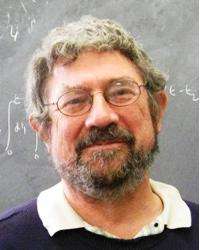J. Michael Kosterlitz
| Michael Kosterlitz | |
|---|---|
 | |
| Born |
John Michael Kosterlitz June 22, 1943[1] Aberdeen, Scotland, United Kingdom |
| Residence | Providence, Rhode Island, U.S. |
| Nationality | British |
| Citizenship | United States |
| Alma mater |
|
| Known for | Kosterlitz–Thouless transition |
| Awards |
|
| Scientific career | |
| Fields | Condensed matter physics |
| Institutions |
Brown University University of Birmingham |
| Thesis | Problems in strong interaction physics (1969) |
| Academic advisors | David Thouless (postdoc) |
| Website |
vivo |
.jpg)
John Michael Kosterlitz (born June 22, 1943) is a Scottish born British-American physicist. He is a professor of physics at Brown University[4] and the son of biochemist Hans Kosterlitz. He was awarded the 2016 Nobel Prize in physics along with David Thouless and Duncan Haldane for work on condensed matter physics.[2]
Education and early life
He was born in Aberdeen, Scotland,[5] to German Jewish émigrés, the son of the pioneering biochemist[6] Hans Walter Kosterlitz and Hannah Gresshöner. He was educated independently at Robert Gordon's College before transferring to the Edinburgh Academy to prepare for his university entrance examinations.[7] He received his Bachelor of Arts degree, subsequently converted to a MA degree, at Gonville and Caius College, Cambridge.[5] In 1969, he earned a Doctor of Philosophy degree[8] from the University of Oxford as a postgraduate student of Brasenose College, Oxford.[5]
Career and research
After a few postdoctoral positions, including positions at the University of Birmingham, collaborating with David Thouless,[5] and at Cornell University,[5] he was appointed to the faculty of the University of Birmingham in 1974,[5] first as a lecturer and, later, as a reader. Since 1982, he has been professor of physics at Brown University. Kosterlitz is currently a visiting research fellow at Aalto University in Finland and since 2016 a distinguished professor at Korea Institute for Advanced Study.
Kosterlitz does research in condensed matter theory, one- and two-dimensional physics; in phase transitions: random systems, electron localization, and spin glasses; and in critical dynamics: melting and freezing.
Awards and honours
Michael Kosterlitz was awarded the Nobel Prize in Physics in 2016,[9] the Maxwell Medal and Prize from the British Institute of Physics in 1981, and the Lars Onsager Prize from the American Physical Society in 2000, especially, for his work on the Kosterlitz–Thouless transition. Since 1993, he has been a Fellow of the American Physical Society.
The Kosterlitz Centre at the University of Aberdeen is named in honour of his father, Hans Kosterlitz, a pioneering biochemist specializing in endorphins, who joined the faculty after fleeing Nazi persecution of Jews in 1934.[10]
Personal life
Kosterlitz was a pioneer in Alpine climbing in the 1960s, known for working routes in the UK, Italian Alps, and Yosemite.[11] There is 6a+ graded route bearing his name in the Orco Valley of the Italian Alps named Fessura Kosterlitz.[12] Kosterlitz is an American citizen and is an atheist.[13]
References
- ↑ "J. Michael Kosterlitz - Facts". Nobel Foundation. Retrieved 2016-11-02.
- 1 2 Gibney, Elizabeth; Castelvecchi, Davide (2016). "Physics of 2D exotic matter wins Nobel: British-born theorists recognized for work on topological phases". Nature. London: Springer Nature. 538 (7623): 18–18. Bibcode:2016Natur.538...18G. doi:10.1038/nature.2016.20722.
- ↑ "Lars Onsager recipient 2000, John Michael Kosterlitz Brown University". aps.org. American Physical Society.
- ↑ "Kosterlitz Research profile at Brown University". brown.edu. Brown University.
- 1 2 3 4 5 6 "Two former Birmingham scientists awarded Nobel Prize for Physics". University of Birmingham. 4 October 2016. Retrieved 4 October 2016.
- ↑ Anatomy of a Scientific Discovery: The Race to Find the Body's Own Morphine, by Jeff Goldberg, Skyhorse Publishing, Inc., 13 Dec 2013, Brain Soup
- ↑ Davidson, Peter (12 December 2016). "Aberdeen-born Academic Picks Up Nobel Prize for Physics". Evening Express. Retrieved 15 December 2016.
- ↑ Kosterlitz, John Michael (1969). Problems in strong interaction physics (DPhil thesis). University of Oxford. EThOS 711269.
- ↑ Devlin, Hannah; Sample, Ian (2016-10-04). "British trio win Nobel prize in physics 2016 for work on exotic states of matter – live". the Guardian. Retrieved 2016-10-04.
- ↑ "Launch of Kosterlitz Centre in Aberdeen 2010". abn.ac.uk. University of Aberdeen.
- ↑ "Mike Kosterlitz 2016 Nobel Prize Winner". alpine-club.org.uk. Alpine Club.
- ↑ "British Climber Michael Kosterlitz awarded Nobel Prize in Physics". ukclimbing.com. UK Climbing 10/2016.
- ↑ “J. Michael Kosterlitz - Biographical.” Nobelprize.org, . "I was a nominal church going Christian until I left home for Cambridge University on a scholarship when, to my great relief, I could drop all religion and become my natural atheist self...My wife and I finally became citizens of the USA in 2004."
